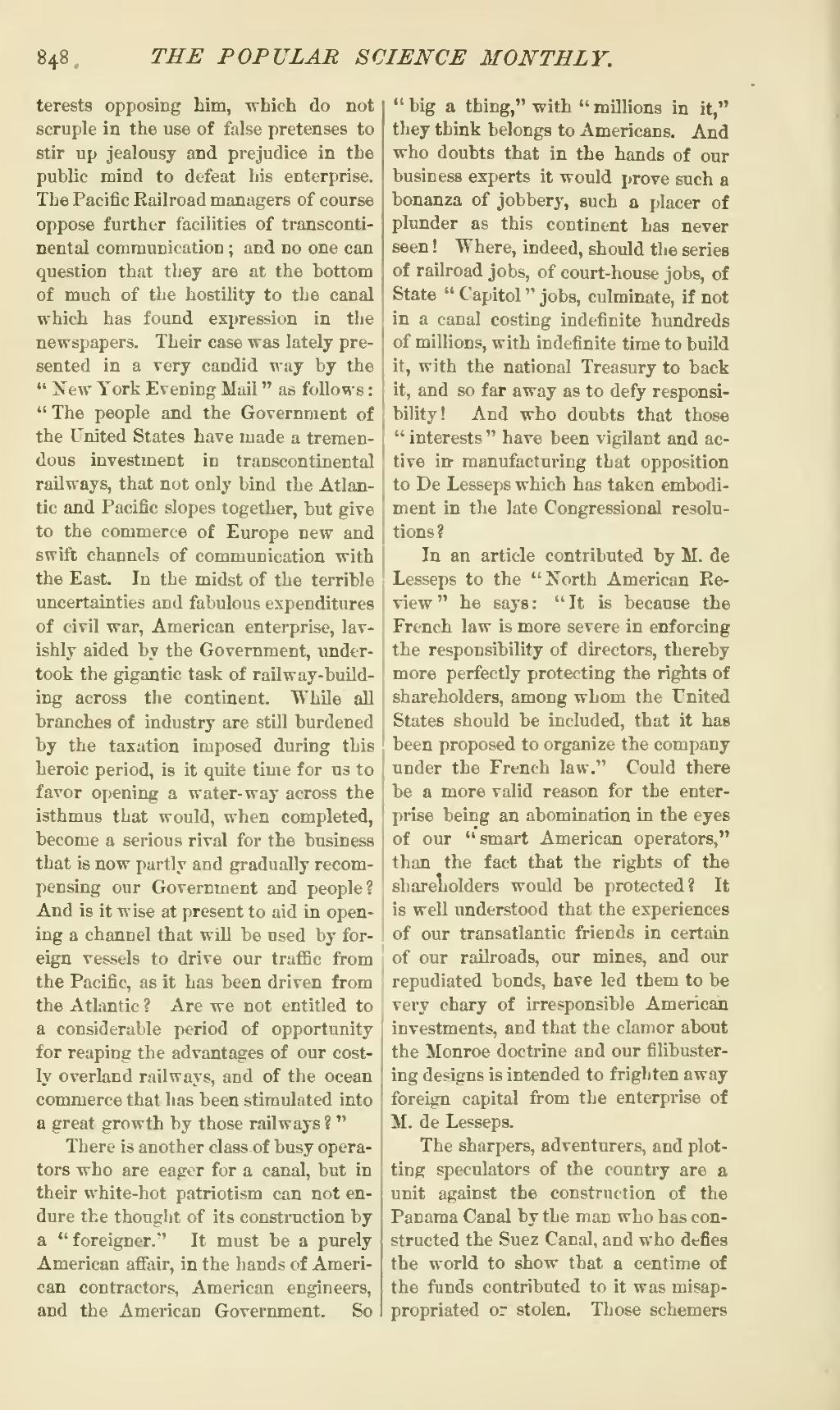terests opposing him, which do not scruple in the use of false pretenses to stir up jealousy and prejudice in the public mind to defeat his enterprise. The Pacific Railroad managers of course oppose further facilities of transcontinental communication; and no one can question that they are at the bottom of much of the hostility to the canal which has found expression in the newspapers. Their case was lately presented in a very candid way by the "New York Evening Mail" as follows: "The people and the Government of the United States have made a tremendous investment in transcontinental railways, that not only bind the Atlantic and Pacific slopes together, but give to the commerce of Europe new and swift channels of communication with the East. In the midst of the terrible uncertainties and fabulous expenditures of civil war, American enterprise, lavishly aided by the Government, undertook the gigantic task of railway-building across the continent. While all branches of industry are still burdened by the taxation imposed during this heroic period, is it quite time for us to favor opening a water-way across the isthmus that would, when completed, become a serious rival for the business that is now partly and gradually recompensing our Government and people? And is it wise at present to aid in opening a channel that will be used by foreign vessels to drive our traffic from the Pacific, as it has been driven from the Atlantic? Are we not entitled to a considerable period of opportunity for reaping the advantages of our costly overland railways, and of the ocean commerce that has been stimulated into a great growth by those railways?"
There is another class of busy operators who are eager for a canal, but in their white-hot patriotism can not endure the thought of its construction by a "foreigner." It must be a purely American affair, in the hands of American contractors, American engineers, and the American Government. So "big a thing," with "millions in it," they think belongs to Americans, And who doubts that in the hands of our business experts it would prove such a bonanza of jobbery, such a placer of plunder as this continent has never seen! Where, indeed, should the series of railroad jobs, of court-house jobs, of State "Capitol" jobs, culminate, if not in a canal costing indefinite hundreds of millions, with indefinite time to build it, with the national Treasury to back it, and so far away as to defy responsibility! And who doubts that those "interests" have been vigilant and active in manufacturing that opposition to De Lesseps which has taken embodiment in the late Congressional resolutions?
In an article contributed by M. de Lesseps to the "North American Review" he says: "It is because the French law is more severe in enforcing the responsibility of directors, thereby more perfectly protecting the rights of shareholders, among whom the United States should be included, that it has been proposed to organize the company under the French law." Could there be a more valid reason for the enterprise being an abomination in the eyes of our "smart American operators," than the fact that the rights of the shareholders would be protected? It is well understood that the experiences of our transatlantic friends in certain of our railroads, our mines, and our repudiated bonds, have led them to be very chary of irresponsible American investments, and that the clamor about the Monroe doctrine and our filibustering designs is intended to frighten away foreign capital from the enterprise of M. de Lesseps.
The sharpers, adventurers, and plotting speculators of the country are a unit against the construction of the Panama Canal by the man who has constructed the Suez Canal, and who defies the world to show that a centime of the funds contributed to it was misappropriated or stolen. Those schemers
